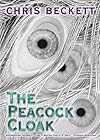Mother of Eden by Chris Beckett
Posted in Reading Reviewed, Science Fiction at 12:00 on 10 October 2015
Corvus, 2015, 481 p.

This is Beckett’s sequel to Dark Eden which won the Clarke Award in 2013. The premise was that three people had been marooned on a planet without a sun located somewhere outside the galaxy – the sky is filled with a view of the Milky Way its inhabitants call Starry Swirl – and that novel was set among their descendants. (For my review of Dark Eden see here.)
This book develops the scenario several generations after the events of the previous one and centres on the artefact known as Gela’s ring, the possession of one of the founders which had been lost and was rediscovered in Dark Eden.
We start in the small community of Knee Tree Grounds where decision making is consensual – and where there are no restrictions on sexual partnering. Very soon Starlight Brooking makes a trading voyage with some companions to the much larger community of Veeklehouse where institutions like guards emphasise the descent from the idyllic the wider world has made and which was instigated in Dark Eden. In Veeklehouse she meets Greenstone Johnson, a visitor from across the large sea known as the Worldpool. Their instant attraction is complicated by his status as Headmanson and her incomprehension of the ways of the settlement of New Earth from where he came. She agrees to go to New Earth with him to become his housewoman (a position of sexual exclusivity – for the housewoman.) Only when she arrives does she discover she will be a figure of adoration, the reincarnation of Gela herself, and the wearer of her ring.
Starlight could have settled for a life of luxury and pampering, but New Earth is a harsh and prejudiced industrial society which appals her. Its big people have discovered how to make their own metal from local rocks, exploit both the small people and the indigenous bats and practise a horrific form of capital punishment (and incidentally due to an old feud, plan to recross Worldpool in force one day and take over the whole of Eden.) New Earth’s motto, carved into the rock above its large entrance door, is Become Like Earth. Sadly, it has.
Greenstone is not a natural leader and faces problems even before his father dies and he succeeds as headman. Together with Gela’s Secret Story – passed down from mother to daughter only – these two circumstances combine to determine Starlight’s actions.
This is a book about foundation myths and their perversion, the persistence of such tales, the unreliability of written sources, their susceptibility to mistaken exegesis, and the genesis of cults. One passage late on suggests that Starlight will herself become an object of veneration in Eden’s future.
Like Dark Eden the narrative is carried via multiple viewpoints, through which we get into many people’s heads. The character of Starlight is engaging, developing from naïvety to suspicion – others are as convincing – and the power dynamics of a “primitive” society are well portrayed. Becket’s world is well-imagined – any quibbles about the viability of human life on Eden are easily laid aside in the following of story (even if the possibility of the local bats being intelligent may be adding a layer too many) – but that story shows that humans are humans no matter where they happen to be and in whatever circumstances they find themselves.
Pedant’s corner:- despite this being a British edition it contains US spellings (center, colored.) I assume the publishers simply lifted the US text. Yet “fitted” appeared as a past tense as it would in Britain. “that it must punished (must be punished,) I look round anxiously (all the rest of the verbs in this passage are in past tense, so “looked”,) sunk (sank.)




